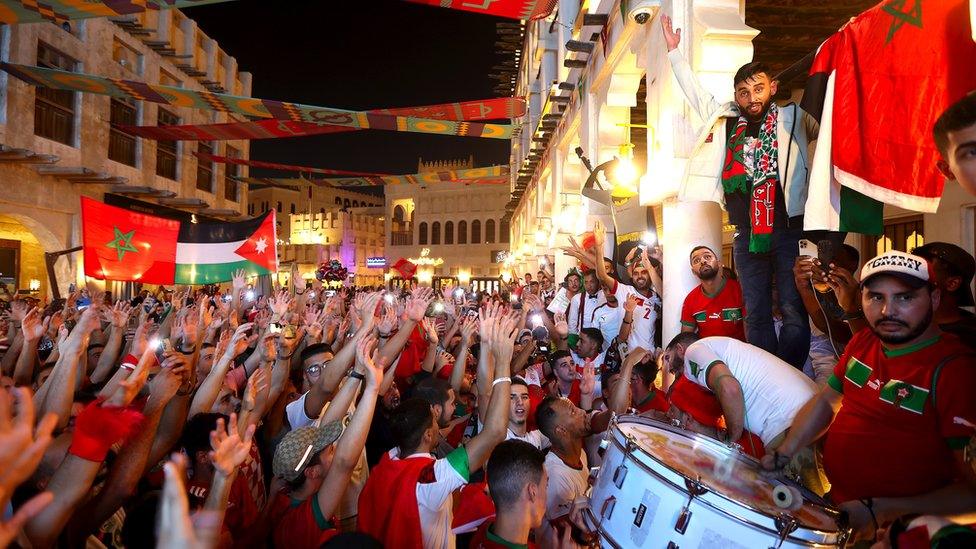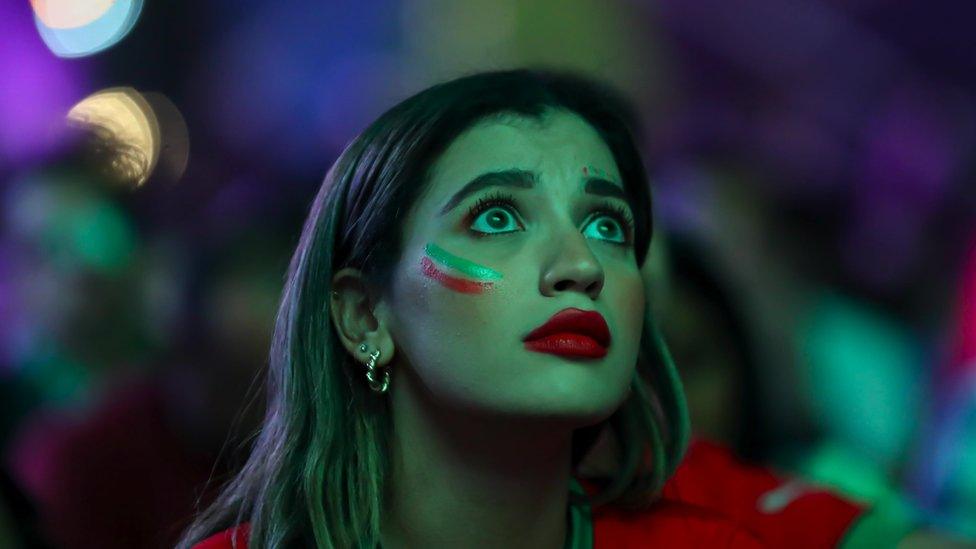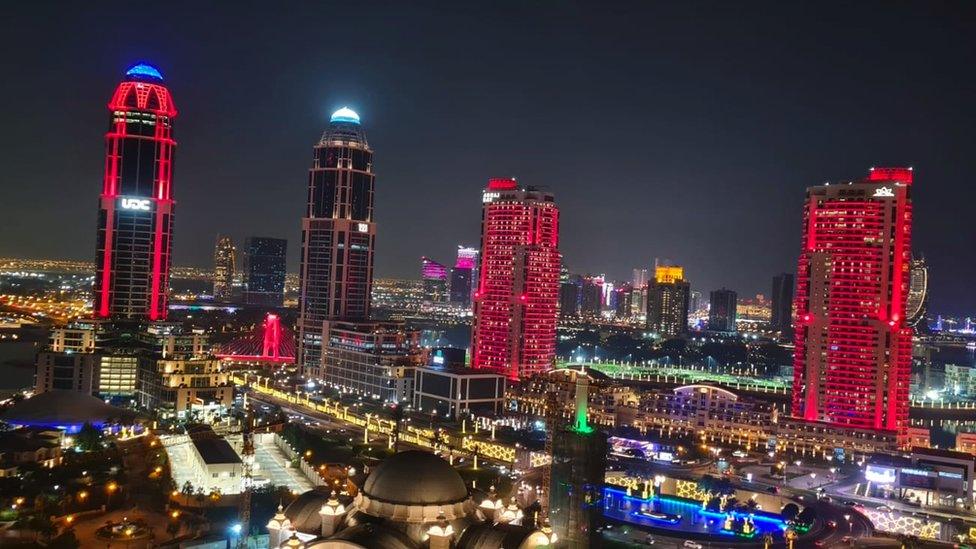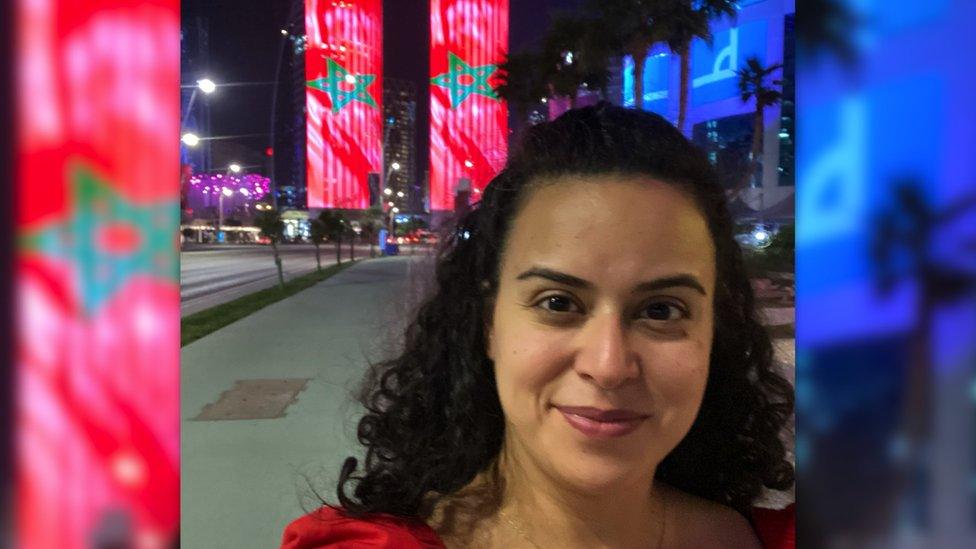World Cup 2022: 'Finally football smiles back at Arabs'
- Published

Arab fans gathered in Doha's Souq Waqif to cheer on various teams
The roars of ecstatic fans, car horns ringing out and buildings draped in red and green.
The atmosphere in Doha after Morocco's historic win against Portugal in the World Cup quarter-finals was enchanting.
"Finally football smiles back at Arabs," one Morocco supporter told the BBC.
The match's atmosphere gave some clues as to the reception the team will get when they face France in the semi-final on Wednesday night.
Whenever a Moroccan player touched the ball, the whole crowd cheered "Sir!" which means "Go on!" in Arabic. And they did.
On 10 December Morocco became the first Arab and African country to make it to the World Cup semi-finals, and I was there to witness it.
A fan from afar
I never thought I'd get to attend a World Cup - let alone one held in an Arab country.
Growing up in the Middle East, the tournament always felt out of reach and too expensive. But it has always meant a lot to me.
Every four years, I watched the games surrounded by family either in my hometown of Aleppo in Syria where I spent most of my summers, or in Riyadh, Saudi Arabia where I grew up.
Cafes would be draped in the flags of different countries, and brawls would erupt between groups supporting countries they had probably never even visited.
We were thousands of miles away from the action but the atmosphere was always memorable.
When I had the opportunity to cover this historic event, I could not hold back my excitement.

Thousands of Moroccan and Arab fans have watched each game nervously
I'm no stranger to the Gulf region. I was born and raised in Saudi Arabia. My parents moved there from Syria in the early 1980s due to political unrest and in search of better economic opportunities.
We often used to visit my uncle and cousins in Qatar for holidays in the 1990s. And although I was just a child, I distinctly remember the Sheraton Hotel building, with its pyramid shape, being the main landmark on Doha's Corniche.
Today, the Sheraton is dwarfed by a sea of high-rise buildings. Even though my last visit to Doha was in 2016, I still find myself unable to recognise many parts of it.
In just a few years, the country has built seven stadiums, a new 'city' on the outskirts of Doha, and rolled out a new metro system.
Loud and proud
The atmosphere has been welcoming in Doha. Scores of international visitors have learned how to say a few simple Arabic phrases. Fans from Croatia to Argentina wore traditional Qatari male clothing, done up in the colours of their national teams.
But for me, it's the huge presence of Arab supporters that has made it special.
"To be an Arab and get a chance to witness the first tournament in an Arab country, it's an honour," one Saudi football fan told me.

Towers in Doha are lit up in the colours of different Arab teams when they won
Three Arab countries qualified for the tournament this year - Morocco, Tunisia and Saudi Arabia. Their fans rushed to Doha to cheer them on.
Even an 86-year old Tunisian woman made her way here. "I'm an old woman, but I did not want to be sitting at home during the World Cup," she told a Qatari TV channel.
On my first trip to Souq Waqif - the traditional-style market in the heart of Doha - I saw a parade of Arab football fans flood its alleyways and courtyards.
Before I knew it, I was chanting with the Tunisian and Moroccan supporters.
It's one thing to get here, it's another to win games. Arab hearts are used to being broken but this time it's been very different.
Morocco has made history. Saudi Arabia achieved one of the biggest upsets in World Cup history by beating Argentina, and Tunisia won against reigning champions France before going home.
"Football is the only thing that has given us this much hope and happiness," a delighted fan told me on Saturday night, as the celebrations continued late into the night in Souq Waqif.
Controversy
But this tournament has been overshadowed by controversy, especially focused on Qatar's contentious records on migrant workers rights.
The country has made reforms and recently admitted that up to 500 workers died in total projects linked to the World Cup. However, human rights groups say this is far below the true figure.
There's a long-standing debate about whether sports should be mixed with politics. The World Cup has been hosted by controversial countries like Russia, which was scrutinised for it's human rights record and stance on LGBT+ issues. However, no tournament has been as controversial as this one.
Many Qataris and foreign residents in Doha have told me they are frustrated over what they call an "avalanche" of negative coverage on Western media outlets. They ask whether it's because Qatar is an Arab and Muslim country.
Mashael al-Salem, a Qatari woman who is an engineer and entrepreneur, told me it was about time the tournament came to the Middle East.
"The attacks we've received have been unprecedented... [the West] had the wrong idea about us Arab Muslims… but many of them have changed their minds when they came here," she said.

Morocco's historic win in the quarter-finals have made millions proud including me
I find myself looking at the media coverage and asking a different question.
Has this tournament set a new standard for scrutiny of sporting events and human rights?
Will we see the same debate at the next World Cup in the USA, Canada and Mexico in 2026?
I know I will be watching, along with millions of fans across the Middle East.